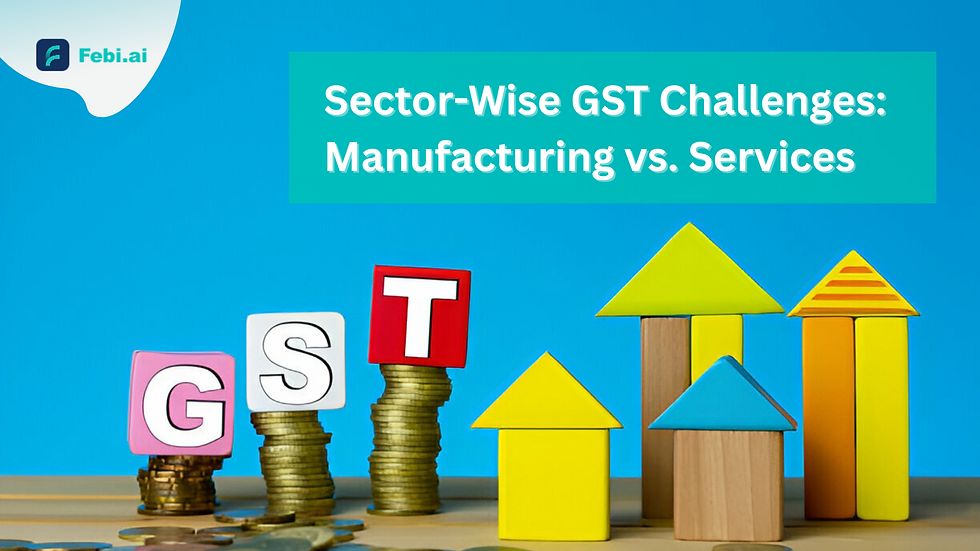Sector-Wise GST Challenges: Manufacturing vs. Services
- Riya Aggarwal

- Jul 3, 2025
- 3 min read
Since its introduction, the Goods and Services Tax (GST) has transformed the Indian taxation system, bringing uniformity and simplifying indirect taxes. However, despite its advantages, sector-specific challenges persist, especially in industries like Manufacturing and Services, which operate under different dynamics.

In this article, we explore the key GST challenges faced by the manufacturing and services sectors, highlighting how compliance complexities vary and what businesses can do to overcome them.
GST Challenges for the Manufacturing Sector
The manufacturing sector is a backbone of the Indian economy, contributing significantly to GDP and employment. While GST has streamlined tax structures, manufacturers still encounter several hurdles:
1. Complex Input Tax Credit (ITC) Management
Manufacturers deal with multiple raw materials and inputs sourced from different states. Tracking, reconciling, and claiming Input Tax Credit (ITC) becomes challenging, especially when suppliers fail to upload invoices or file returns on time.
2. E-Way Bill Compliance
Transportation of goods requires E-Way Bills, adding administrative work, especially for businesses operating across states. Any discrepancy in documentation can result in delays, penalties, or seizure of goods.
3. Classification Disputes
Determining the correct HSN Code and tax rates for different products often leads to ambiguity, resulting in disputes and tax notices.
4. Inverted Duty Structure
In certain cases, the tax rate on inputs is higher than the tax rate on finished goods, creating working capital blockages. Though refunds are allowed, the process is often time-consuming.
5. Compliance Costs for MSMEs
Small and medium manufacturers face a significant compliance burden due to regular GST return filings, reconciliations, and audits, increasing operational costs.
GST Challenges for the Services Sector
The services sector operates differently, focusing on intangible deliverables, yet it faces its own set of GST-related challenges:
1. Place of Supply Rules
For service providers, determining the place of supply can be complicated, especially for businesses providing services across multiple states or internationally. Incorrect determination may lead to tax disputes or incorrect filings.
2. Multiple Registrations
Service providers offering services across India may need to obtain GST registrations in multiple states, even without a physical presence, increasing administrative efforts.
3. Reverse Charge Mechanism (RCM)
Service businesses often deal with the Reverse Charge Mechanism, particularly for import of services, requiring careful tax accounting and compliance monitoring.
4. Export of Services & Refunds
While export of services is considered a zero-rated supply, claiming refunds of unutilized ITC can be tedious and delayed, impacting cash flows.
5. Continuous Compliance Updates
The services sector, especially technology, consultancy, and professional services, must frequently adapt to changes in GST laws, interpretations, and notifications, which adds to compliance stress.
Comparative View: Manufacturing vs. Services GST Challenges
Aspect | Manufacturing Sector | Services Sector |
Input Tax Credit (ITC) | Complex due to multiple inputs, suppliers | Simpler but refund delays for exporters |
Place of Supply | Mostly clear based on goods movement | Complicated, especially for cross-border services |
E-Way Bills | Mandatory for goods transportation | Not applicable for intangible services |
Compliance Burden | High for multi-location production units | High due to multi-state service delivery |
Tax Classification | Product-based HSN codes often cause disputes | Service classification may lead to ambiguities |
Best Practices to Tackle GST Challenges
✅ Automate GST return filings and reconciliations using reliable accounting software
✅ Regularly train finance teams on evolving GST rules
✅ Seek professional guidance for classification and compliance issues
✅ Monitor supplier compliance to safeguard ITC claims
✅ Streamline documentation to avoid disputes during audits or inspections
Conclusion
While GST has simplified India's tax landscape, sector-specific challenges in manufacturing and services continue to demand attention. Manufacturers grapple with E-Way Bills, ITC complications, and product classifications, whereas service providers face complexities around place of supply, multi-state registrations, and RCM compliance.
Businesses must stay proactive, adopt technology, and ensure expert tax advisory support to navigate these challenges and ensure seamless GST compliance.



Comments